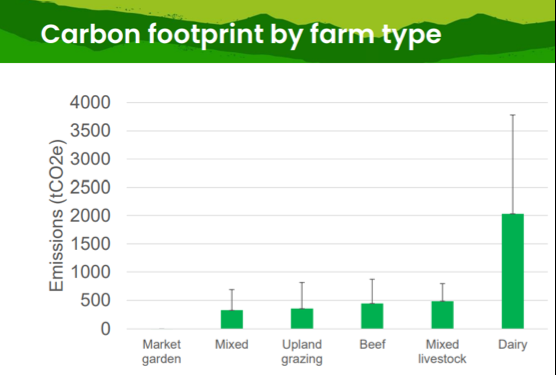
Written by Alex Bebbington, Project Officer, Rural Business School, Duchy College
Kindly hosted at Mike and Sam Roberts Farm Net Zero Demonstration Farm
The first Farm Net Zero Farmer Conference was held at Blable Farm, Wadebridge by kind permission of Demo Farmers, Mike and Sam Roberts. The conference covered the Farm Net Zero (FNZ) project’s progress to date and discussed plans for the remainder of the project. Over 70 people attended the conference, with 31 individuals from 19 of the project’s Monitor Farms.
We started the conference with a farm walk led by Mike and Sam Roberts. A range of cover crop mixtures are being trialed this winter for outwintering cattle, these were established by drilling into disced hay aftermaths. The aim for these cover crops is to cheaply outwinter cattle and benefit soil health. The extreme weather conditions this summer delayed sowing, but now these crops are growing apace. Buffer feeding with hay may be necessary alongside the grazing of these crops; it will depend upon how warm the autumn is.
A rotational grazing system has been developed with the support of Precision Grazing Ltd, with herbal leys introduced for drought resilience and to improve pasture quality for the cattle’s diet. The heaviest steers have been sold to a finishing unit having received nothing but forage. The Roberts’ are aiming to grow cattle on forage alone and are looking at introducing more native genetics (Angus/Hereford/Devon) to achieve this aim.
Finally, the walk finished in the cattle sheds to discuss the compost bedding. Compost from the Green Waste Company is used in place of straw to reduce costs, the resulting dirty compost bedding has been analysed for nutrient content and far exceeds that of farmyard manure. Blable has recently been soil mapped by FNZ Monitor Farmers Anthony Ellis and Tom Tolputt of South West Farm Consultants. The detailed soil scan and sample has revealed areas of high and low organic matter and nutrients. The maps will be used to target applications of manure to get the most benefit from it and will help to reduce the need for artificial fertiliser.
The remainder of the conference involved presentations and discussions on project progress. After an introduction to Farm Net Zero by Dr Steve Roderick, Alex Bebbington from the Rural Business School ran through the fifteen events the FNZ project has delivered so far, on a range of topics from nitrogen fertiliser use to dung beetles.
Dr Hannah Jones from Farm Carbon Toolkit then gave a presentation on the results from the first set of carbon footprints. These form the baseline from which the project aims to reduce emissions and improve sequestration and there is a possibility to create benchmarking groups within the project to help farmers learn from one another. Hannah’s presentation also covered some of the FNZ trials, with input from the Demo and Monitor Farmers who are involved in the trials. Demo Farmer Andrew Brewer spoke about the herbal ley for dairy cattle trial. Andrew’s grazing platform consists of ryegrass/clover leys and herbal leys, Allflex collars on the cows measure activity and rumination. This work is in progress and evaluation of the economic viability of dairies needs to take a systems approach incorporating livestock health, milk quality and yield, and the resilience of the grazing platform to variation in weather. Next, Monitor Farmer Malcolm Barrett talked through the overwinter cover crop trial he is involved in. This was to test the diversity of cover crop mixes, with initial results suggesting that more diversity improved soil stability and increased worm numbers. Finally, Monitor Farmer Amelia Lake spoke about her involvement in the first of the FNZ Field Labs on compost production for market gardens. Amelia’s use of compost on her no-dig market garden has helped to increase soil carbon sequestration, but questions remain on the best source material and methods of production.

Jerry Alford from Innovative Farmers provided more detail on the Field Lab element of Farm Net Zero. These field labs are led by questions from farmers and are run on farms to be representative of commercial conditions. The first FNZ Field Lab is on compost for market gardens, the second will be on innovations in maize establishment and the third is yet to be decided.
Zoë Smith from Westcountry Rivers Trust spoke about the citizen science work that the Rivers Trust are responsible for. This involves members of the public working to improve the soil health and climate resilience of their gardens/allotments.
The final presentation by Becky Willson of Farm Carbon Toolkit looked at some of the techniques farmers from other Farm Carbon Toolkit projects are working on to reduce their carbon footprints. These include reducing purchased feed requirements, improving grazing management and reducing fertiliser use. There was also a conversation on the various Carbon Codes (Hedgerow, Woodland and Soil) and how they can benefit farmers, the consensus being that there are still details to iron out before it can be seen as a reliable investment.
This event was made possible with thanks to the National Lottery Community Fund who fund the Farm Net Zero project. We would also like to thank the Demo and Monitor Farmers who have hosted events, the expert speakers who have presented at them and everyone who has attended a Farm Net Zero event.
